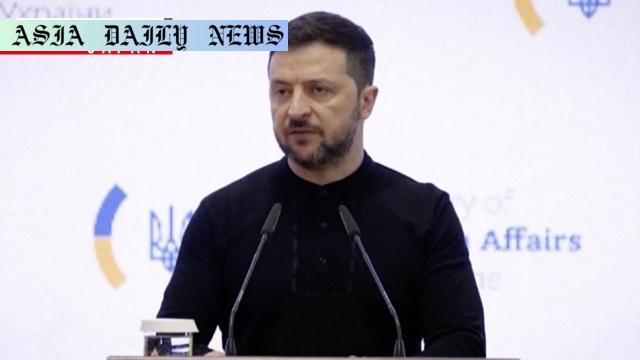Kursk is seeing renewed North Korean troops’ presence, complicating the regional tensions further.
- North Korean troops reportedly redeployed in Kursk, western Russia.
- Ukrainian President claims ‘hundreds’ of Russian and North Korean soldiers eliminated in battles.
- South Korean intel suggests North Korea may send reinforcements due to prior casualties.
- Russia reportedly captured Toretsk, gaining strategic advantage in eastern Ukraine.

North Korean Forces Redeploy in Kursk
President Volodymyr Zelenskyy of Ukraine has reported renewed sightings of North Korean troops fighting alongside Russian forces in Kursk, a region in western Russia near the border with Ukraine. Zelenskyy claimed in a video address that these troops were “brought in again” to counter Ukrainian cross-border activities and assaults. This statement comes after weeks of speculation that North Korean forces had retreated or were absent from active operations in the area.
He emphasized that recent engagements resulted in the elimination of hundreds of combined North Korean and Russian troops, highlighting the heavy toll on allied forces. Ukrainian military experts had earlier noted the withdrawal of North Korean units from the Kursk region. However, new deployments suggest that Pyongyang might be bolstering its commitments amidst challenges faced by its forces.
South Korean and Ukrainian Intel Insights
The situation has also caught the attention of South Korea’s National Intelligence Service (NIS). The NIS highlighted that North Korean soldiers seemed to be missing from recent combat scenarios in Kursk. Officials speculated this could be attributed to significant casualties that weakened operational capabilities. In addition, Pyongyang might now be preparing to send reinforcements to replenish their decimated numbers, adding to the strategic complexities of the region.
This development reflects North Korea’s controversial alliance with Russia in its ongoing conflict with Ukraine. While Pyongyang’s increased involvement had seemed to taper off, the redeployment of troops signals its readiness to remain a steadfast ally to Moscow. Experts suggest North Korea is not just lending manpower, but also leveraging these engagements to strengthen ties with Russia politically and militarily.
Strategic Shifts: Toretsk Captured by Russian Forces
In another significant development, Russia’s defense ministry announced the successful capture of the city of Toretsk in eastern Ukraine. Toretsk, located on elevated terrain, serves as a link to key cities in the Donetsk region. Military analysts have noted the strategic importance of this gain, as it could disrupt Ukrainian logistics and provide Russia with a vantage point for advancing its eastern campaign.
The city’s capture signals a notable victory for Russia in a conflict filled with setbacks and stalled operations. Ukrainian experts acknowledge that this advance complicates their defensive strategies significantly. The high ground location of Toretsk might allow Russian forces to launch further offensives or consolidate control over occupied territories, marking a potential turning point in the eastern theater of the war.
Impact on the Global Stage
The implications of the ongoing conflict reverberate beyond its immediate locality. North Korea’s apparent deepening involvement introduces complexities at the geopolitical level. By supporting Moscow, Pyongyang may be aiming to secure economic or military support in return. This ties into a broader trend of strategic alignments in a world increasingly divided along ideological and regional lines.
Meanwhile, South Korea and other global players are closely monitoring this development, as Pyongyang’s actions come amidst heightened tensions in the Korean Peninsula. The redeployment of North Korean troops not only underscores their commitment to Russia but also raises concerns over the extent and limits of their cooperation in potentially destabilizing regions further.
This renewed activity around Kursk and the gains in Toretsk underline the evolving nature of a conflict where boundaries, both literal and figurative, seem fluid.



Commentary
Geopolitical Implications of North Korean Troop Deployments
The reported redeployment of North Korean troops in Kursk brings with it significant international ramifications. This move not only highlights the deepening alliance between Russia and North Korea but also raises new concerns about the involvement of external actors in regional conflicts. Pyongyang’s decision to reignite its presence follows speculation of prior withdrawals due to casualties—a reminder of its considerable losses in supporting Moscow’s campaign.
Perhaps more unsettling is the suggestion that North Korea could send additional troops, reinforcing its commitment to Russia despite the heavy costs. Does this signal a new phase in the Ukraine-Russia conflict, with players like North Korea playing an increasingly active—and divisive—role? Such questions take on more weight given the geopolitical ripple effects, particularly in destabilizing neighboring regions or emboldening other nations to deepen unconventional alliances.
A Shifting Battlefield in Eastern Ukraine
On another front, Russia’s capture of Toretsk represents a notable, if grim, development. Strategic victories like these often shift the dynamics of conflict, and Toretsk’s location on high ground gives Moscow a tactical edge. For Ukraine, this loss could disrupt critical supply lines and complicate defensive operations, underscoring the challenges of holding strategic terrain amidst a high-stakes war.
As global attention remains fixed on these unfolding developments, one cannot help but ponder the heavy human and political cost of such victories. Both Ukraine and its allies will need to reassess their strategies while keeping a wary eye on new players entering the fray.